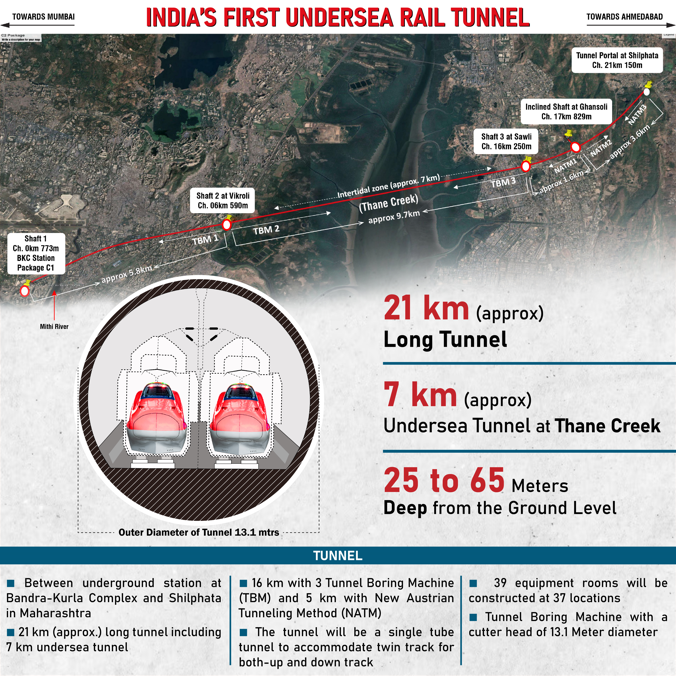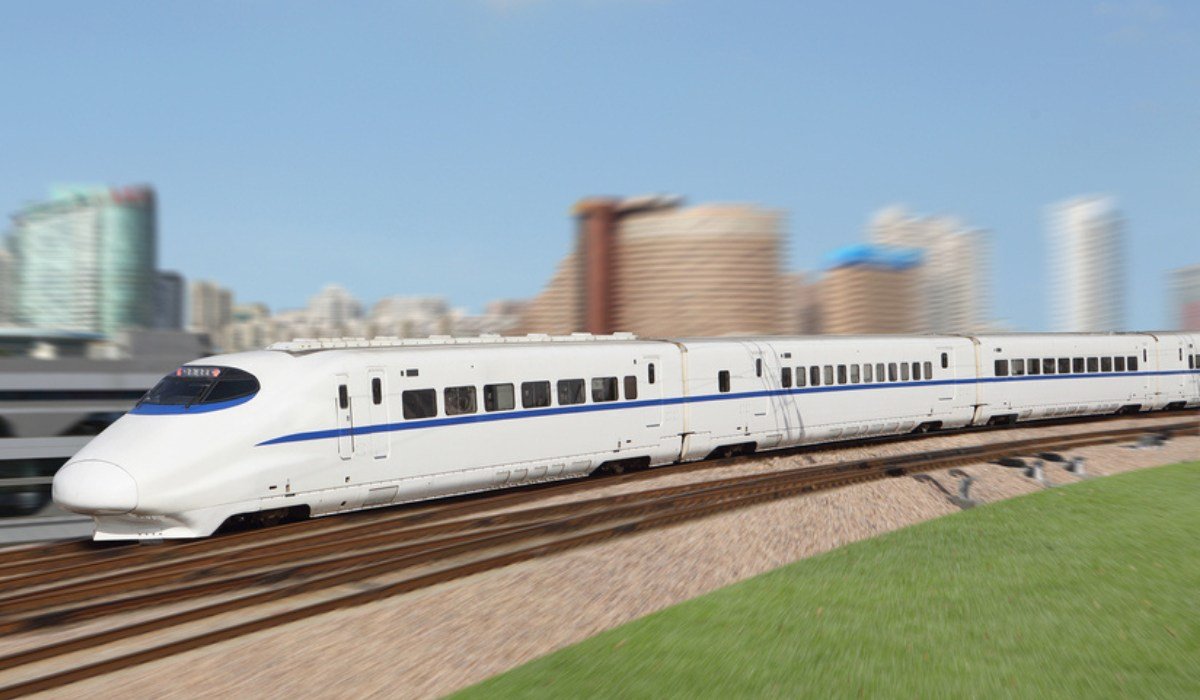The Mumbai-Ahmedabad High-Speed Rail Corridor (MAHSR) is being developed to connect two major cities, Mumbai and Ahmedabad. This would be the country’s first high-speed rail line, which will significantly reduce the travel time between both cities from 6 hours 35 minutes to 1 hour 58 minutes.
The project is being implemented by the National High-Speed Rail Corporation Limited (NHRCL), with the assistance of the Japanese government, at an estimated cost of Rs. 1.1 lakh crore. The bullet train is expected to serve 92,000 passengers per day by 2053. According to the Railway Ministry, the Mumbai-Ahmedabad bullet train project is 26% complete, which means that it may be delayed by four years from its original deadline of December 2023. The railway and telecom minister, Ashwini Vaishnaw said that the Mumbai-Ahmedabad Bullet Train service will be operational by August 2026.
See also: All about NHSRCL and India’s eight bullet train projects
Mumbai-Ahmedabad Bullet Train: Construction details
The Mumbai-Ahmedabad high-speed rail corridor will have 12 stations over 508 km through Maharashtra, Gujarat and Dadra & Nagar Haveli. The network will be 155.76 km long in Maharashtra (7.04 km in Mumbai suburban, 39.66 km in Thane and 109.06 km in Palghar), 348.04 km long in Gujarat and 4.3 km long in Dadra & Nagar Haveli.
A total of 1,396 hectares will be acquired for the project with 956 hectares in Gujarat, eight hectares in Dadra & Nagar Haveli and 432 hectares in Maharashtra.
The trains on the Mumbai-Ahmedabad high-speed rail corridor will run on an elevated viaduct 10-15 m above the ground, except a 26-km line in Mumbai, which will be built underground, using 3 mega Tunnel Boring Machines (TBM). All the stations, except the Bandra-Kurla Complex (BKC) station, would be on an elevated route.
Mumbai-Ahmedabad Bullet Train: Stations
In Maharashtra
- Mumbai
- Thane
- Virar
- Boisar
In Gujarat
- Vapi
- Bilimora
- Surat
- Bharuch
- Vadodara
- Anand
- Ahmedabad
- Sabarmati
Mumbai-Ahmedabad Bullet Train: Features
- The bullet train project is being developed based on Japan’s E5 Shinkansen technology.
- The high-speed train will operate at 350 km per hour, covering the distance between the two cities in less than three hours.
- The trains will be equipped with modern facilities, including a new range of toilet systemsand changing rooms for babies.
- The bullet train will have a seating capacity of 731 passengers.
- There would be 35 trains per day in one direction; every 20 minutes during peak hours and every 30 minutes during non-peak hours.
- Noise barriers have been installed along the viaduct to reduce train noise without obstructing passengers’ view.
India’s first undersea rail tunnel to be built at Thane Creek
The NHSRCL has signed a contract with Afcons Infrastructure for the construction of a 21-km tunnel in Maharashtra. One of the largest Tunnel Boring Machines (TBMs) will be deployed by next year to dig India’s first undersea rail tunnel. The undersea tunnel at Thane creek will be seven-kilometre-long and around 25 to 65 metre below the ground level. Sixteen kilometre of the tunnel will be executed using TBMs and five kilometre will be developed with the new Austrian Tunnelling Methodology.

Source: NHRCL
Mumbai-Ahmedabad Bullet Train: Project timeline
- February 2016: The National High-Speed Rail Corporation Limited (NHSRCL), a special purpose vehicle (SPV), was established for planning and executing bullet train projects in India
- July 2020: 60% of the land was acquired for the project
- February 2021: Larsen and Toubro (L&T) began construction work
- June 2021: Project reviewed by the railway minister
- January 2022: NHSRCL acquired 71% of the total land required in Maharashtra
- February 2022: Land acquisition completed in Gujarat
Mumbai-Ahmedabad Bullet Train: Project cost
The Mumbai-Ahmedabad Bullet Train project is being developed at an estimated cost of Rs 1.1 lakh crore. This includes 24 trainsets, construction interest and import duties.
The Japan International Cooperation Agency (JICA) would fund 81% of the project cost through a 50-year loan of Rs 88,087 crore at an interest rate of 0.1% with a moratorium on repayments of up to 15 years. The remaining cost would be funded by the Maharashtra and Gujarat state governments and the central government.
JICA has signed an agreement with India to provide an Official Development Assistance (ODA) loan of Rs 18,750 crore as Tranche 4 for the development of the Mumbai-Ahmedabad high-speed rail corridor. As per an official JICA statement, this is the largest amount committed through a single project loan agreement in the history of JICA.
Mumbai – Ahmedabad Bullet Train: Land acquisition
Maharashtra has overtaken Gujarat in acquiring land for the upcoming Ahmedabad-Mumbai bullet train project. The land acquisition process, which started in 2018, is nearing completion with Maharashtra acquiring 99.75% of the land in the state, according to the data by National High Speed Rail Corporation Ltd (NHSRCL).
The remaining 1.07 hectare are yet to be acquired in Maharashtra where NHSRCL has paid a compensation of Rs 3,217 crore for 1,984 private plots. An area of 4.83 hectare in suburban Mumbai has been acquired fully, small plots of 0.32 hectare in Palghar and 0.75 hectare in Thane are pending to be acquired for the project.
Gujarat, on the other hand, is slightly behind with completion of 98.91% of land acquisition process as on April 24, 2023. About 10.53 hectare are remaining to be acquired in the state where Rs 6,104 crore has been paid for 6,248 private plots. Of the eight districts where the bullet train will pass through, 100% land acquisition has been completed in Kheda, Anand, Navsari and Valsad districts. The highest quantum of pending acquisition is in Vadodara at 5.47 hectares, followed by Surat with 4.89 hectare. Land areas of 0.02 hectare and 0.05 hectare in Ahmedabad and Bharuch respectively are pending to be acquired.
While 100% of the 7.9 hectares of land was acquired in Dadra and Nagar Haveli in September 2021, the land acquisition process in Gujarat and Maharashtra could not be completed within the initial deadline of December 2018.
Mumbai-Ahmedabad Bullet Train: Latest updates
MoU signed for station area development
The housing ministry and the railways ministry jointly signed an memorandum of understanding (MoU) with Japan International Corporation Agency (JICA) on May 8, 2023 for the station area development along the high-speed rail corridor (Project . The MoU was signed for four high-speed rail stations, including Sabarmati, Surat, Virar and Thane.
The project Smart, known as Station Area Development along Mumbai-Ahmedabad High-Speed Rail, focuses on enhancing accessibility and convenience for commuters and other stakeholders.
FAQ
How fast is the bullet train from Ahmedabad to Mumbai?
The Mumbai-Ahmedabad bullet train will travel at a speed of 320 kilometres per hour over a distance of 508 kilometres and 12 stations. The travel time will be less than three hours.
| Got any questions or point of view on our article? We would love to hear from you.
Write to our Editor-in-Chief Jhumur Ghosh at [email protected] |
Harini is a content management professional with over 12 years of experience. She has contributed articles for various domains, including real estate, finance, health and travel insurance and e-governance. She has in-depth experience in writing well-researched articles on property trends, infrastructure, taxation, real estate projects and related topics. A Bachelor of Science with Honours in Physics, Harini prefers reading motivational books and keeping abreast of the latest developments in the real estate sector.











